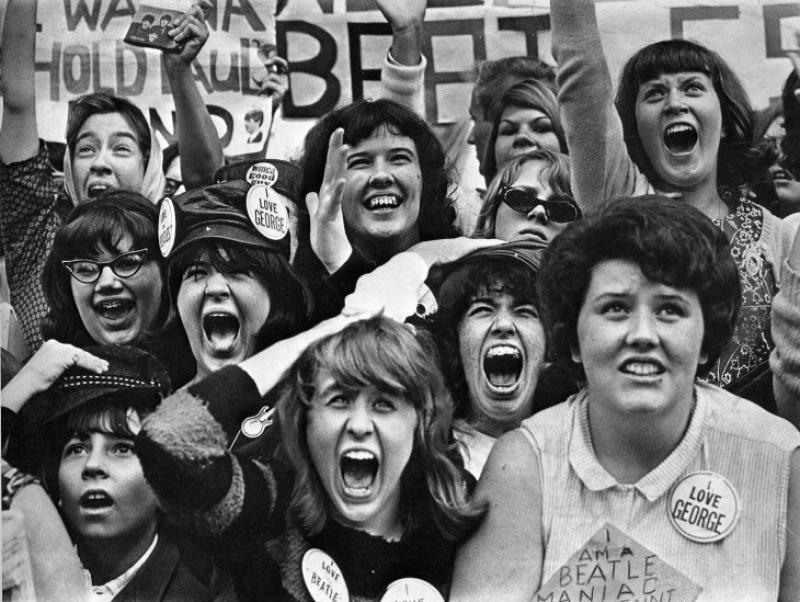When Pop Ruled My Life, BBC Four | reviews, news & interviews
When Pop Ruled My Life, BBC Four
When Pop Ruled My Life, BBC Four
Study of obsessive fandom from the Beatles to One Direction is funny but sad

A long time ago I went out into the field to research a feature about the three ages of obsessive fandom. At the entry level was a bog-standard legion of young teenage girls who simply hung around outside the mansion block in Maida Vale where one or possibly both of the Gosses (of Bros) lived. I also met three young women who had access to Jason Donovan’s diary and were traipsing around town in the hope of glimpse. Donovan’s star had waned but they hadn’t moved on.
There was another George lookalike in When Pop Ruled My Life: The Fan's Story. (Or maybe it was the same one.) Daron was his name but alas Daron didn’t really know where Daron ended and George began. Now leathery and gnarled, Daron’s look was no longer working so well and a life had apparently been tossed away on the altar of someone else’s fame.
Mossman, a journalist, is a natural on television, warm and unjudgemental
In this charming essay, by turns funny and sad, Kate Mossman (pictured below) attempted to work out what makes an obsessive fan tick. She has form herself, being a self-confessed ex-stalker of Roger Taylor, behind whom she once sat in a Cornish cinema for two hours, communing with the back of his head. Her narrative of pop mania began, of course, with the caterwauling of Beatlemaniacs, seeping liquids from kohl-rimmed eyes and other orifices. (Do I hear you say “yuk”? We have the say-so of the Red Cross re. teen fan incontinence.) Compare and contrast with the sophisticated fans of One Direction. They use the online forum of slash fiction to fantasise scenarios in which Harry and Louis snog each other. Presumably a safer option than seeing them cop off with female rivals. We met one Texan who has one billion clicks for her work. Move over, JK Rowling.
This was essentially a social history of pop by the back door, and the roster of names on the guest list was impressive. Musicians lined up to anatomise their fans, from cuddly Rick Wakeman via scary Siouxsie Sioux to Jazzie B, and the fans had their say too. Les McKeown, jowly but still in tartan, remembered waving through the limo window at hordes of screeching Rollermaniacs, one of whom remembered looking back at him as he waved.
 No one talked about sex, apart from someone called Roxana Shirazi, an Iranian-Mancunian and author of a book about bedding half the US Billboard charts. It would have been fun to hear from one of her conquests/victims, and enlightening to know a little more about what made her do it. But hey, for all the valid musings of pop culture thinkers Mark Ellen and Simon Price, Mossman’s ultimate finding is that obsessive fandom – “the love that never really dies”, she called it – is essentially a mystery. “Why did you have to scream?” she asked a Beatlemaniac called Lillian. “I’ve got absolutely no idea,” said Lillian. “You just did.”
No one talked about sex, apart from someone called Roxana Shirazi, an Iranian-Mancunian and author of a book about bedding half the US Billboard charts. It would have been fun to hear from one of her conquests/victims, and enlightening to know a little more about what made her do it. But hey, for all the valid musings of pop culture thinkers Mark Ellen and Simon Price, Mossman’s ultimate finding is that obsessive fandom – “the love that never really dies”, she called it – is essentially a mystery. “Why did you have to scream?” she asked a Beatlemaniac called Lillian. “I’ve got absolutely no idea,” said Lillian. “You just did.”
For young women these feelings mushroom overnight and are evidently bound up in a hormonal need. But girls move on, grow up, have reality-check encounters with non-pinups. A lot of this enquiry was actually about the true obsessives: blokes. Male fans can take a wrong turn and many decades later they’re still wearing their hair the same as in 1965 or, worse, 1972. For mods, progs and goths, often finding a home for their sense of alienation, identifying with bands seems to be an escape from self, a defence against the world. It’s a slippery slope. We visited the shed of a wizened Iron Maiden hoarder in specs who confessed that “once you start going down this route it’s really really tough to stop”. His wife had long since left the building.
This is such a rich field that inevitably not every question could be asked. “He was always the boy that didn’t want to grow up,” said Stephen, a roly-poly Jackomaniac in a security-guard jumper. “You didn’t want him to grow up,” he added, nearly tearful. You sensed that Stephen was the one who didn’t want to grow up.
Mossman, a journalist, is a natural on television, warm and unjudgemental, so hope for more from her. Shame she didn’t track down Roger Taylor for old time’s sake and commune with the front of his head.
The future of Arts Journalism
You can stop theartsdesk.com closing!
We urgently need financing to survive. Our fundraising drive has thus far raised £33,000 but we need to reach £100,000 or we will be forced to close. Please contribute here: https://gofund.me/c3f6033d
And if you can forward this information to anyone who might assist, we’d be grateful.

Subscribe to theartsdesk.com
Thank you for continuing to read our work on theartsdesk.com. For unlimited access to every article in its entirety, including our archive of more than 15,000 pieces, we're asking for £5 per month or £40 per year. We feel it's a very good deal, and hope you do too.
To take a subscription now simply click here.
And if you're looking for that extra gift for a friend or family member, why not treat them to a theartsdesk.com gift subscription?

Add comment